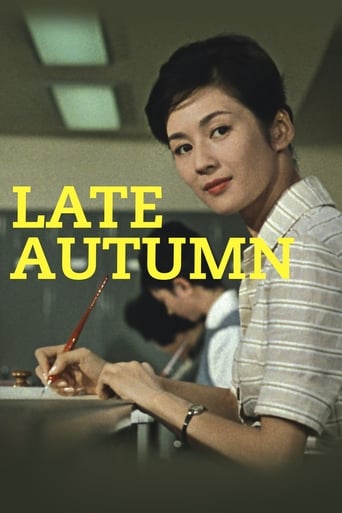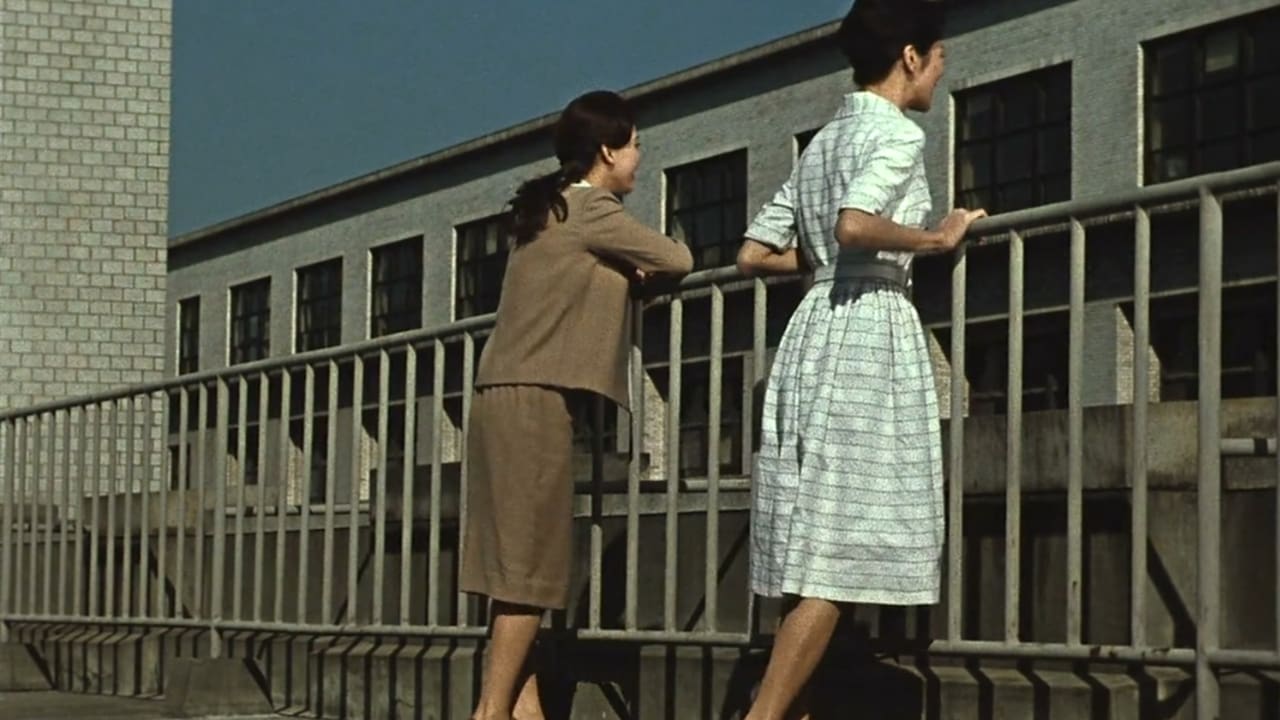MartinHafer
I have seen practically every film available that were directed by Yasujirô Ozu. While he's considered by many to be a genius, I would say that he was an ultra-conservative--a man who developed some interesting techniques and story ideas but never really changed with the times. So, if you see an Ozu film from 1935, 45, 55 or the early 60s, there is an amazing sameness about them--something no other director ever accomplished. This is not criticism--this is fact. Ozu did stories about the Japanese family--and very often about widowed parents striving to get their now adult children married. And, his actual techniques didn't vary much. Although "Late Autumn" is in color (a few of his later ones were), it uses the same stationary camera and floor level for the shots. Ozu truly was a man who liked to do variations on the same themes and in the same styles! Because of this, while "Late Autumn" is expertly crafted, it really isn't innovative in the least other than making both the main characters women.This story begins with a memorial service for a man who has been dead for several years. After the service, three friends of the deceased and his widow discuss her as well as her 24 year-old daughter. They love these women and it hurts them to see the daughter is still unmarried despite being a lovely person. So, the three schemers decide that it's their task to get the girl married--whether she likes it or not! Unfortunately, their plans don't always go as they intended and ultimately it takes one of the young lady's friends to give them some assistance.Other than this film be very mildly comic as well as the use of the three friends, the film is yet another lovely and very deliberately paced Ozu film. If you haven't seen too many of his films, then by all means watch this one. If you have and feel you've gone down this same road many times before, they try a film by another fine director. Even die-hard fans would agree that there is an amazing similarity between this and most of Ozu's films--particularly his later ones.
samhill5215
Of Ozu's trilogy on marriage Japanese style this one is my favorite. In fact many of my comments apply to the other two, Late Spring (1949) and Early Summer (1951). All three deal with the concept of marriage as seen in traditional Japanese society and even though to my western eyes it seems antiquated, Ozu manages to present it as a sensible, inherently logical way to pair two people. But what ultimately attracts me to his work is his presentation. The plot unfolds in a slow, languorous way. It's linear but with gaps in time which are fully explained so that we are not left guessing as to intervening events. What we see and hear is the important stuff. We, in essence, are eavesdropping on intimate family conversations, the kind of things discussed at every dinner table, things important to a family but more or less irrelevant to the outside world. Somehow Ozu makes that interesting. Naturally the actors play an important part and the presence of two of my favorite Japanese actors, Setsuko Hara and Chisu Ryu, in all three are a definite plus. So why is this one my favorite? Humor and lots of it. The first two are rather serious, drama-filled works where the characters exhibit much angst. Late Autumn on the other hand is light and airy, there's a bounce to it, and it's filled with a lot of sexual innuendo that is completely absent from the others. It's as if Ozu was saying to us that the post-WWII years was a time for Japan to buckle down to the serious work of rebuilding society. By 1960 the joy of living had returned to his country. It could afford the bumbling of three well-meaning and occasionally lecherous men whose efforts at match-making were only half successful.
theskulI42
Well, it was bound to happen eventually: The more films I viewed from noted Japanese auteur Yasujiro Ozu, there was going to come a time when my well of interest ran dry. I have now seen ten of his films, and Ozu seems unique among filmmakers, even the most praised, by being essentially the anti-Billy Wilder. Where Wilder's mind was so brilliantly scattered that he did pictures in nearly every conceivable genre, and did them well, Ozu was always more interested in mining different stories out of the same cloth, hopping from patch to patch on a quilt of nuanced familial drama. Where Wilder branched out, Ozu dug his roots in deep. He had an exclusive stable of actors, comprising some of the most talented and, like their helmsman, subtly versatile actors in the business, including the transcendent Chishu Ryu and the great Sestuko Hara, appearing here as the mother to the always-adorable Yoko Tsukasa, essaying the role that Hara herself brought to life in Late Spring. Ryu has the remarkable ability to present to us a man of any age with very little in the way of physical alterations (in the span of five years, he played father, brother and grandfather to Hara and was utterly convincing in all). Hara has the exact opposite gift: That of an ageless wonder. Early on in Late Autumn, a comment is made that Hara and her daughter Tsukasa look more like sisters than mother-daughter, and it's absolutely true. In the eleven-year span from Spring to Autumn, Hara has swapped roles but kept the same face, and she brings her A-game yet again, looking more weary and fatigued than ever before.But there's a problem. Where Ozu's style had always seemed evocative and direct, here is seems...stilted and awkward. The use of direct address in discussions seems disjointed and stiff. What felt emotionally confrontational in Late Spring comes off here as almost amateurish, merely content to blandly cut back and forth between one talking head and another. The fact that he's done that all his career perhaps says something about this film as an individual entity. Or perhaps it's just become all too familiar. When you're looking to derive a myriad of tales from the same few thematic points, there's always the danger of indifference; having the same actors play similar characters doing similar things in similar ways in movies with similar titles, it's a testament to his brilliance that he managed to make it more than one film, but here, it all just strikes of creative exhaustion: He's seemingly run out of stories to the point that he's now reworking the similar stories he's already done, as this is almost directly a remake of his 1949 masterpiece Late Spring, except mostly from the female perspective. While it appears to be a monumental shift for such a gradual director (I still remember first experiencing Tokyo Story and being so startled by its singular tracking shot that I was shaken to my core), actually far too little is new. Most of the motions and emotions we are presented with were all essentially inferred in Late Spring, and this seems if nothing else, an unnecessary diversion to a place we're already been.Now this is not to say that the film is a complete dud. Everyone involved is so talented that they can't help but stumble into several moments of effective heartstrain, most notable the touching restraint of the final shot, but I just can't shake the feeling that with Late Autumn, instead of hopping to a new stitch on the quilt, he's stepping right back onto trampled-down, treaded ground. Where Late Spring presented this story and devastated me, going right to my heart and laying me out flat. To Late Autumn I'm a bit more...subdued. I never connected to the characters or the situation in any tangible or meaningful way, and my response to the film was less "Holy crap" and more "ho-hum".{Grade: 6.5/10 (B-/C+) / #24 (of 34) of 1960}
Daniel Vazquez
Ozu's common themes of ageing, filial ties and modernisation are as present here as in many other of his films. But in this film, as well as the melancholy and gentleness we are accustomed to, there are large doses of comedy which makes this film far more accessible for the uninitiated.The story centres around a widow (Setsuko Hara) and her daughter (Yoko Tsukasa). The daughter doesn't want to get married because she wants to care for her mother, whereas the mother wants her daughter to marry even though she realises she'll be left alone. So far everything is extremely familiar. Except that in this case the dead husband's friends get involved, trying to find suitors for both mother and daughter, thus creating comical situations, causing family tensions, and finally necessitating for the daughter's friend to step in and sort out the mess.All in all highly recommended for anyone who wishes to try out this highly prestigious director, and a strong reminder for fans of why we love him so much.


 AD
AD



